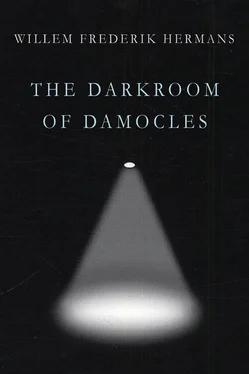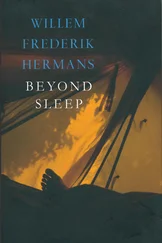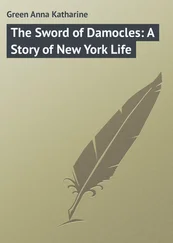Father Beer began to laugh heartily.
‘It has never occurred to me.’
‘There’s something else I’d like to ask you, something I’ve been curious about all my life. That little circle on the top of your head, do you maintain it with a razor, or are there special tonsure clippers for priests? Are there optional courses in tonsure maintenance?’
Father Beer was now choking with laughter.
‘Is it hard to learn?’ asked Osewoudt. ‘Does it involve taking exams?’
‘That is one of the best kept secrets of the liturgy,’ said Father Beer. ‘I would risk being defrocked if I told you.’
Osewoudt did not laugh. He said: ‘I am boring you, and you are boring me. Conversation between you and me is pointless. You go around with holly and candles. If it were up to me, everybody in this building would be taken outside and shot, Christmas or no Christmas. They might still gain redemption after death, anyway. My case and theirs don’t compare. My presence here is a strange accident. I feel no hatred for the people holding me here. If someone gets a falling rock on his foot and the foot has to be amputated, his entire life will be changed for ever. Yet he won’t hate the stone. It’s the same with me. It happens in every war, apparently, that soldiers get hit by their own side. My situation is a bit like that. But once Dorbeck’s existence has been proved, everything will be different. That is all I hope for, nothing more exalted than that.’
‘You are being presumptuous,’ said Father Beer. ‘You are putting justice above redemption. But suppose justice is too long in coming?’
‘It makes no difference to me.’
‘How can you say that? Or is it because, in case Dorbeck turns up after you’re dead, the people who have your death on their conscience will be consumed by remorse? Is that what you want?’
‘Don’t make me laugh! What’s in it for me, once I’m dead, if someone who knew no better feels consumed by remorse years later? Besides, I don’t believe in being consumed by remorse, as far as I’m concerned it doesn’t exist. During the war I killed the father and mother of a small boy with my own hands. The father was scum, but the child had done nothing. I caused that child great sadness, I changed the course of his life, but I had no choice. I don’t feel remorse. In the same way, the people mistreating me will always insist they had no choice. And if I’m not shot and it takes another ten years, say, for them to find Dorbeck, I’ll still have spent ten years behind bars for nothing. Ten years which can never be made good. Ten years in prison is one of the heaviest sentences going. But if they let me out they’ll act as if I should be grateful.’
Osewoudt burst into a coughing fit, stuffed the sheet into his mouth to stifle the noise, but it didn’t help.
‘After ten years in prison for nothing, there would only be one way for you to get on with your life,’ said Father Beer. ‘You would have to forgive those who trespassed against you. Do you see? Whatever happens, it all comes down to redemption in the end.’
Osewoudt shook his head.
‘Whether I forgave them or not wouldn’t matter a hoot to them, because—’
‘You don’t understand! It’s not about other people, it’s about your own welfare!’
‘—because the reason they’ve put me in prison is not that Dorbeck can’t be found, the reason is that I have a high voice like a castrato, a face like a girl and no beard. I’ve been imprisoned in this body all my life; my appearance has made me what I am. That is the answer to the riddle.’
Father Beer’s face flushed a deep red; he began to blow his nose on a filthy handkerchief which he had whisked from his skirts as if by magic.
Then he said: ‘But if what you’re saying is true, then how else could you be saved than by redemption?’
‘What’s the point of my life,’ replied Osewoudt, ‘if I was born under a curse which can only be lifted through being redeemed? Is that what I’m living for — to have two gifts bestowed on me that cancel each other out, when I never asked for any gifts in the first place? I never asked for anything. I never asked to be born, I never asked to be cursed at birth, nor do I ask to be redeemed at death. And if there’s nothing left for me but to die, I won’t be needing redemption anyway: the end of my life will mean the end of the curse. You may be able to wangle redemption for your converted traitors and murderers, but what could that kind of redemption mean for me? Let’s give it a rest. You have tired me out. I’m ill, I have a fever, and I’ve been in this stinking ward for over a month already. I don’t care about the afterlife. All I care about just now is finding the camera I used to take a photo of Dorbeck. Once that’s been found, once I’m able to present Selderhorst with a genuine picture of Dorbeck, I’ll be halfway to salvation. Then at last he’ll have eyes for Dorbeck, not me. That’s all the salvation I ask for.’
‘We’ll talk again some time then,’ said Father Beer. ‘I’ll be praying for you.’
‘What about?’
‘I’ll pray for the Leica to be found. I’ll beseech all the saints for its recovery.’
Osewoudt turned over on his side, muttering: ‘I wish they wouldn’t sing “Silent Night”.’
On Christmas Day, before the carol singing started, Father Beer appeared at Osewoudt’s side and said: ‘I’ve been praying for you. I prayed for the Leica to be found.’
Osewoudt couldn’t think of anything better to say than: ‘That was very kind of you.’
When Father Beer made to leave after the carols, he said, in passing: ‘I shall pray for you again. Times like these tend to be most auspicious for the granting of special prayers. I will be back tomorrow; we’ll have some more singing. You needn’t join in if you don’t want to, you know!’
Father Beer kept his word and returned on Boxing Day. Carols were duly sung, and some parcels were handed out. There was nothing for Osewoudt, because there was no one to send him anything.
Father Beer came to sit at his bedside.
‘I prayed to all the saints on your behalf. I’ll go on praying until that camera is found. God’s goodness is infinite, and we must not despair.’
But Osewoudt turned over on his side and said: ‘Well, if it’s all the same to you, I have a headache. I’d prefer to rest. You and I were never destined to see eye to eye.’
On the morning of 27 December, Selderhorst came into the ward. Sister Kruisheer followed, holding a brown woollen dressing gown over her arm and a pair of slippers in her hand.
Selderhorst carried a small cardboard box with the flaps open. ‘Well now, Osewoudt, guess what’s in here!’
Osewoudt sat up in bed and held out his hands for the box.
‘A present from Father Christmas,’ said Selderhorst, lifting the box teasingly just out of his reach.
‘It’s not my Leica, is it?’
‘You never know. Have a look.’
He put the box down on Osewoudt’s knees.
Osewoudt pushed the flaps aside and lifted the camera out of the box. His high tenor shrilled out in the ward.
‘When was it found? This morning?’
‘Oh no, we’ve had it for a week or so. Is it yours?’
‘Yes! It’s mine!’
Osewoudt turned the rewind knob.
‘And the film’s still in it!’
‘It must be yours. At least, the serial numbers match those you gave us. And it’s still got the film in it.’
‘Then why haven’t you had the film developed? If you had, you’d have seen that Dorbeck’s on it!’
‘Have it developed? No! You’d better do that yourself — you being such an expert developer! You did pretty well with those films of Olifiers, remember? Now you can have a go developing a film of your own.’
Читать дальше












